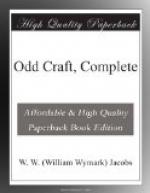“And I shall want some glue, and Miss Gunnill, and some tin-tacks,” said Drill.
“What do you want me for?” inquired Selina.
“To hold the things for me,” replied Mr. Drill.
Miss Gunnill tossed her head, but after a little demur consented; and Drill, ignoring the impatience of the constable, picked up his bag and led the way into the kitchen. Messrs. Gunnill and Jenkins, left behind in the living-room, sought for some neutral topic of discourse, but in vain; conversation would revolve round hard labour and lost pensions. From the kitchen came sounds of hammering, then a loud “Ooh!” from Miss Gunnill, followed by a burst of laughter and a clapping of hands. Mr. Jenkins shifted in his seat and exchanged glances with Mr. Gunnill.
[Illustration: “From the kitchen came sounds of hammering.”]
“He’s a clever fellow,” said that gentleman, hopefully. “You should hear him imitate a canary; life-like it is.”
Mr. Jenkins was about to make a hasty and obvious rejoinder, when the kitchen door opened and Selina emerged, followed by Drill. The snarl which the constable had prepared died away in a murmur of astonishment as he took the helmet. It looked as good as ever.
He turned it over and over in amaze, and looked in vain for any signs of the disastrous cracks. It was stiff and upright. He looked at the number: it was his own. His eyes round with astonishment he tried it on, and then his face relaxed.
“It don’t fit as well as it did,” he said.
“Well, upon my word, some people are never satisfied,” said the indignant Drill. “There isn’t another man in England could have done it better.”
“I’m not grumbling,” said the constable, hastily; “it’s a wonderful piece o’ work. Wonderful! I can’t even see where it was broke. How on earth did you do it?”
Drill shook his head. “It’s a secret process,” he said, slowly. “I might want to go into the hat trade some day, and I’m not going to give things away.”
“Quite right,” said Mr. Jenkins. “Still—well, it’s a marvel, that’s what it is; a fair marvel. If you take my advice you’ll go in the hat trade to-morrow, my lad.”
“I’m not surprised,” said Mr. Gunnill, whose face as he spoke was a map of astonishment. “Not a bit. I’ve seen him do more surprising things than that. Have a go at the staff now, Teddy.”
“I’ll see about it,” said Mr. Drill, modestly. “I can’t do impossibilities. You leave it here, Mr. Jenkins, and we’ll talk about it later on.”
Mr. Jenkins, still marvelling over his helmet, assented, and, after another reference to the possibilities in the hat trade to a man with a born gift for repairs, wrapped his property in a piece of newspaper and departed, whistling.
“Ted,” said Mr. Gunnill, impressively, as he sank into his chair with a sigh of relief. “How you done it I don’t know. It’s a surprise even to me.”




